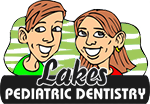There is nothing more worrying for a parent or caregiver than when a baby or young child has an accident. Accidents involving the teeth, tongue, gums or lips can be very painful and can also lead to further complications. The first thing to do? Remain calm! There are steps you can take to minimize the damage, prevent infection and provide temporary relief for the pain until you can get the child to their pediatric dentist or an emergency room.
According to the American Academy of Pediatric Dentistry (AAPD), dental emergencies include a knocked out tooth (either a baby tooth or permanent tooth), a tooth that has been knocked loose, a chipped or fractured tooth, a severe blow to the head or a jaw fracture.
For any of these, see your pediatric dentist as soon as possible. If it is after regular office hours, you should go to a hospital emergency room.
What to do immediately if:
- A child’s baby tooth gets knocked out – Do not try to put the tooth back into the child’s mouth, as this may cause damage to the permanent tooth that is developing underneath.
- A child’s permanent tooth gets knocked out – Locate the tooth, if you can and gently rinse it in cool water. Hold it from the crown (top) and not by the root. Do not use soap and don’t scrub it. If possible, put the tooth back into the empty socket immediately and hold it secure with a piece of gauze or washcloth. If this isn’t possible, put the tooth into a clean container that has been filled with cold milk, saliva or water. Bring the child (and the tooth) to their pediatric dentist or emergency room immediately.
- The tooth is fractured or chipped – Rinse the child’s mouth with warm water and, if the lip was also injured, apply a cold compress to the mouth to reduce the swelling. If you have the tooth fragment, place it in cold milk or in water to bring with you to the dentist.
- The child bites their tongue or lip – Gently clean the area with water and apply a cold compress. Depending upon the severity, you may need to go to the dentist or an emergency room.
- A jaw fracture or a severe blow to the head – Call 911 immediately. A serious head injury can be life threatening. If you think their jaw might be broken, apply cold compresses to reduce the swelling while they’re being transported to the hospital.
Is a toothache (without any accident) considered an emergency?
Whether it’s a child or an adult, even a case of mild tooth pain may indicate a more serious condition, so it shouldn’t be ignored. Visit your dentist as soon as possible. In the meantime:
- Have them rinse their mouth with warm salt water (table salt in warm water). The AAPD recommends this to reduce inflammation. It’s also effective to temporarily relieve tooth pain.
- Examine their mouth to see if a piece of food or another object is stuck in their teeth. If so, gently remove it with floss but do not use any kind of sharp instrument.
- Apply an ice pack, cold gel pack or cold compress to the outside of the cheek to reduce swelling.
- Use an age-appropriate over-the-counter oral anti-inflammatory medication. A liquid will be easier for the child to take than a chewable pill. Do not put aspirin on the toothache, as it might burn the gum tissue.
- Try clove oil as a natural alternative. It’s an antibacterial and topical analgesic that’s effective for relieving tooth pain. Use a cotton swab to dab the oil around the tooth in the affected area. If you can’t find clove oil, look for it as an active ingredient in an oral medication.
Even if the child experiences some relief, you should still visit their dentist at your earliest convenience. They may require a stronger prescription medication or a dental procedure for complete treatment.
 Directions
Directions
